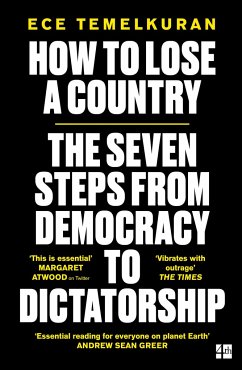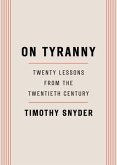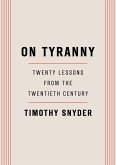'It couldn't happen here'
Ece Temelkuran heard reasonable people in Britain say it the night of the Brexit vote.
She heard reasonable people in America say it the night Trump's election was soundtracked by chants of 'Build that wall.'
She heard reasonable people in Turkey say it as Erdogan rigged elections, rebuilt the economy around cronyism, and labelled his opposition as terrorists.
How to Lose a Country is an impassioned plea, a warning to the world that populism and nationalism don't march fully-formed into government; they creep. Award winning author and journalist Ece Temelkuran, identifies the early-warning signs of this phenomenon, sprouting up across the world from Eastern Europe to South America, in order to define a global pattern, and arm the reader with the tools to root it out.
Proposing alternative, global answers to the pressing - and too often paralysing - poltical questions of our time, Temelkuran explores the insidious idea of 'real people', the infantilisation of language and debate, the way laughter can prove a false friend, and the dangers of underestimating one's opponent. She weaves memoir, history and clear-sighted argument into an urgent and eloquent defence of democracy.
No longer can the reasonable comfort themselves with 'it couldn't happen here.' It is happening. And soon it may be too late.
Hinweis: Dieser Artikel kann nur an eine deutsche Lieferadresse ausgeliefert werden.
Ece Temelkuran heard reasonable people in Britain say it the night of the Brexit vote.
She heard reasonable people in America say it the night Trump's election was soundtracked by chants of 'Build that wall.'
She heard reasonable people in Turkey say it as Erdogan rigged elections, rebuilt the economy around cronyism, and labelled his opposition as terrorists.
How to Lose a Country is an impassioned plea, a warning to the world that populism and nationalism don't march fully-formed into government; they creep. Award winning author and journalist Ece Temelkuran, identifies the early-warning signs of this phenomenon, sprouting up across the world from Eastern Europe to South America, in order to define a global pattern, and arm the reader with the tools to root it out.
Proposing alternative, global answers to the pressing - and too often paralysing - poltical questions of our time, Temelkuran explores the insidious idea of 'real people', the infantilisation of language and debate, the way laughter can prove a false friend, and the dangers of underestimating one's opponent. She weaves memoir, history and clear-sighted argument into an urgent and eloquent defence of democracy.
No longer can the reasonable comfort themselves with 'it couldn't happen here.' It is happening. And soon it may be too late.
Hinweis: Dieser Artikel kann nur an eine deutsche Lieferadresse ausgeliefert werden.
'Highly readable and vibrates with outrage' The Times, Hannah Lucinda Smith
'A brilliant analysis of how democracy can be starved to death. It's one of the most important books anyone could read at the moment, when public institutions are slowly being corrupted wherever we look' Philip Pullman
'Temelkuran, a treasure of a novelist, turns a nonfiction eye to the burning topic of today: populism. Vivid, visionary, terrifyingly familiar, How To Lose A Country is essential reading for everyone on planet Earth'
Andrew Sean Greer, Pulitzer Prize winning author of Less
'May be the most important political book you read in 2019 ... Her tone is brave, deeply personal, witty, honest and melancholic in its delivery, with the writer's style leaning more toward emotional humanism than cold-blooded rational political science' The Globe and Mail
'This is a keenly observed and passionately written book. Read it or be prepared to lose your country'
Rabih Alameddine
'The opponents of authoritarian populist and nationalist regimes have often failed to foresee or effectively resist their rise until it was too late. This highly informed and original book is essential reading for anybody who wants to understand the forces that are convulsing our world' Patrick Cockburn, author of Rise of the Islamic State
'Ece Temelkuran is a passionate authentic voice whose fearless stand against authoritarian incursion is inspiring. She writes with an urgent conviction that has never been more important than now' Tina Brown
'An important, current and, most importantly, very readable book about the populist playbook and how it threatens to engulf us all' Rick O'Shea
'A stunning, sane and intimate chronicle of a world gone nuts. An urgent whisper in our ears about our modern dictators and their collaborators. Ece has looked them in the eye, and is now telling us we need talk' Mohammed Hanif
'A brilliant analysis of how democracy can be starved to death. It's one of the most important books anyone could read at the moment, when public institutions are slowly being corrupted wherever we look' Philip Pullman
'Temelkuran, a treasure of a novelist, turns a nonfiction eye to the burning topic of today: populism. Vivid, visionary, terrifyingly familiar, How To Lose A Country is essential reading for everyone on planet Earth'
Andrew Sean Greer, Pulitzer Prize winning author of Less
'May be the most important political book you read in 2019 ... Her tone is brave, deeply personal, witty, honest and melancholic in its delivery, with the writer's style leaning more toward emotional humanism than cold-blooded rational political science' The Globe and Mail
'This is a keenly observed and passionately written book. Read it or be prepared to lose your country'
Rabih Alameddine
'The opponents of authoritarian populist and nationalist regimes have often failed to foresee or effectively resist their rise until it was too late. This highly informed and original book is essential reading for anybody who wants to understand the forces that are convulsing our world' Patrick Cockburn, author of Rise of the Islamic State
'Ece Temelkuran is a passionate authentic voice whose fearless stand against authoritarian incursion is inspiring. She writes with an urgent conviction that has never been more important than now' Tina Brown
'An important, current and, most importantly, very readable book about the populist playbook and how it threatens to engulf us all' Rick O'Shea
'A stunning, sane and intimate chronicle of a world gone nuts. An urgent whisper in our ears about our modern dictators and their collaborators. Ece has looked them in the eye, and is now telling us we need talk' Mohammed Hanif








